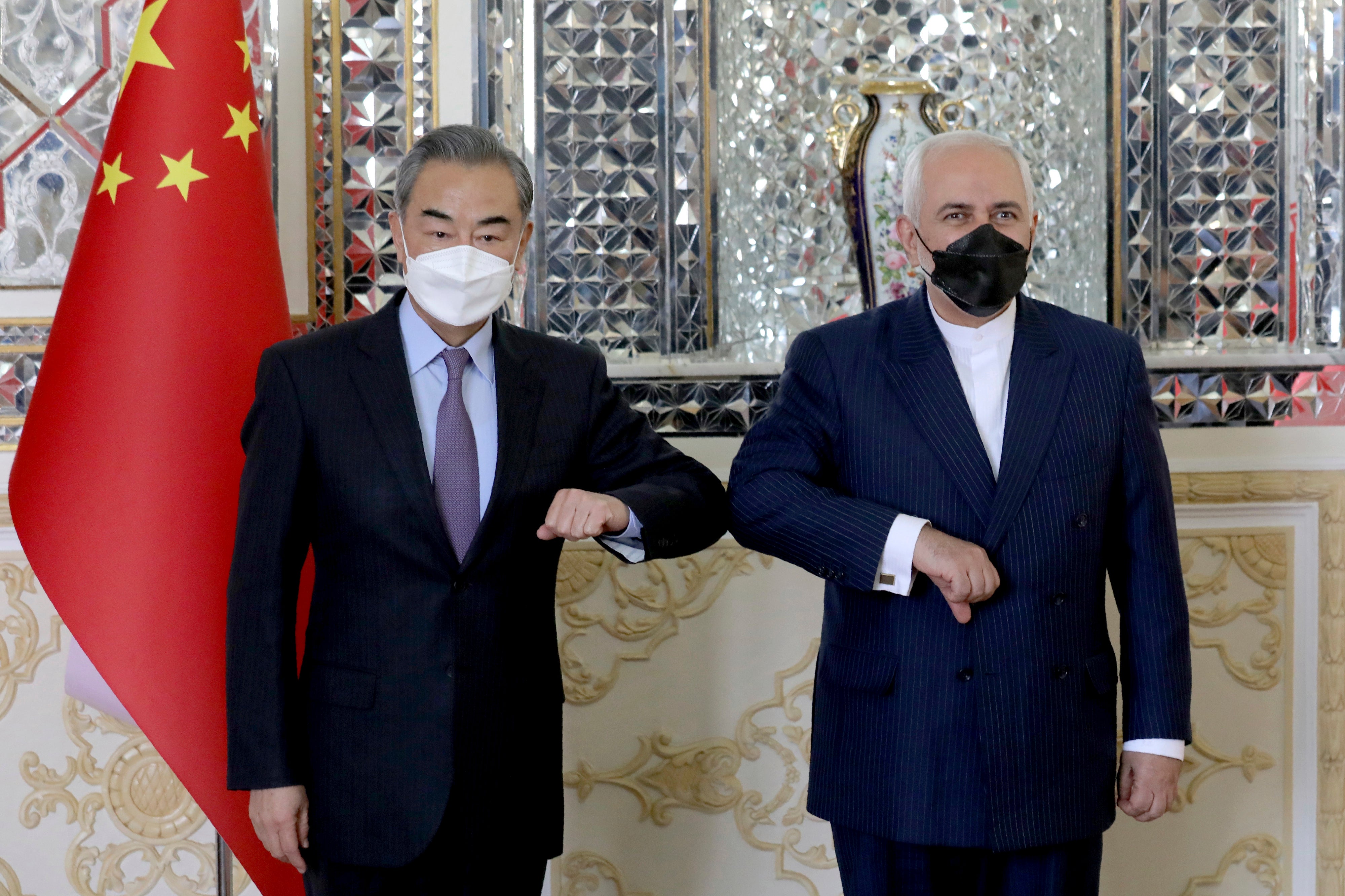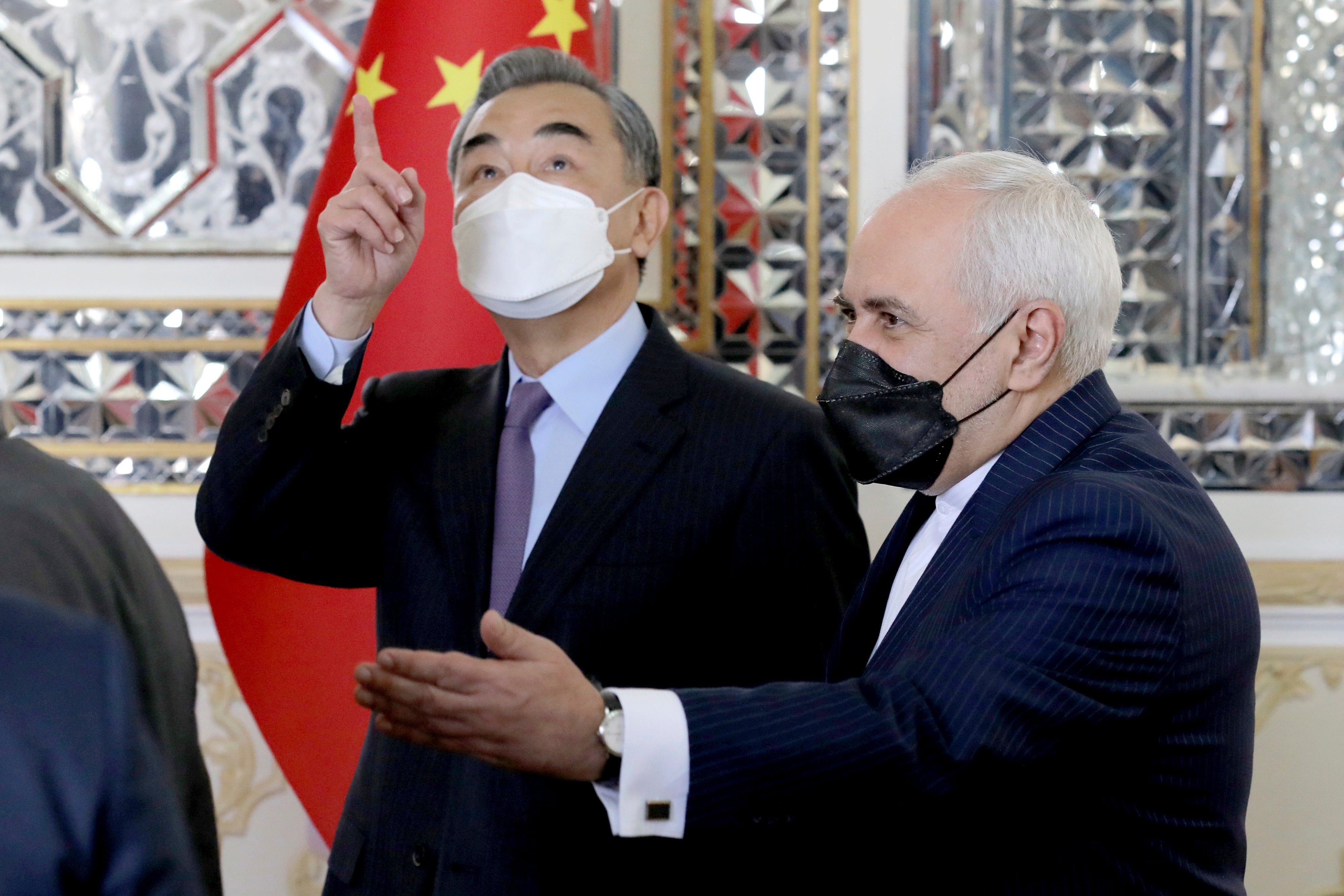Iran and China sign 25-year-deal and send a message to the US
Trade and and defence agreement has been signed between Tehran and Beijing

Your support helps us to tell the story
From reproductive rights to climate change to Big Tech, The Independent is on the ground when the story is developing. Whether it's investigating the financials of Elon Musk's pro-Trump PAC or producing our latest documentary, 'The A Word', which shines a light on the American women fighting for reproductive rights, we know how important it is to parse out the facts from the messaging.
At such a critical moment in US history, we need reporters on the ground. Your donation allows us to keep sending journalists to speak to both sides of the story.
The Independent is trusted by Americans across the entire political spectrum. And unlike many other quality news outlets, we choose not to lock Americans out of our reporting and analysis with paywalls. We believe quality journalism should be available to everyone, paid for by those who can afford it.
Your support makes all the difference.A long-discussed trade, investment and defence pact signed between Iran and China over the weekend provides Tehran more breathing room as it attempts to fend off American pressure to return to the nuclear deal without preconditions.
But it remains unclear what if any concrete immediate changes the 25-year deal signed between Beijing and Tehran will entail.
“The deal is significant. The timing is important,” said Esfandyar Batmanghelidj, a London-based analyst and economic development specialist focusing on Iran and Central Asia.
“Iran is trying to signal that it has partners even at a time of tension and difficulty. At the same time, this is an effort by Iran to catch up with other countries. It is not a signal that Iran and China are to have a uniquely deep and expansive relationship.”
Asked about the strengthening of ties between Iran and China, United States President Joe Biden on Sunday replied that he’s “been concerned about that for years”.
Read more:
Hungry for energy and rebounding economically from the coronavirus pandemic, China already imports more Iranian oil than any other country in the world—despite stinging US sanctions that impede almost all commerce with Iran.
Both Iran and China conduct joint military exercises, most recently with Russia in the Indian Ocean in February, and have cooperated on intelligence matters for years, with Tehran believed to have provided Beijing sensitive information about American drones and human espionage networks.
The strategic cooperation agreement between Iran and China would bring the Islamic Republic into Beijing’s Belt and Road Initiative, a global infrastructure project meant to expand Chinese influence and investments in dozens of nations across the world as it vies with the US to become the world’s largest economy.
The deal has been in the works for five years.
It was put on the table after Iran and world powers, including China, signed the 2015 nuclear deal which former US President Donald Trump later abandoned in favour of a controversial policy of sanctions and low-level military escalation aimed at destabilising and impoverishing Iran.
Iran responded by ramping up its nuclear programme by increasing both the production and purity of its enriched uranium stockpile beyond limits set by the agreement. Mr Biden promised to return to the nuclear deal once elected president, but has since demanded Iran first return to full compliance. Iran has refused, insisting the US first remove sanctions.
The deal with China boosts Iran as it squares off with the US. “It’s certain that Iran will get some political benefit from this,” said Jacopo Scita, a researcher at Durham University specialising in Sino-Iranian relations.
“They will try to exaggerate this deal to show that they are not isolated, to show that if sanctions are not lifted that they have a plan B,” he said. “From China, there’s a message in this to the US, so say that we pursue our business and don’t care about your policies, and if we want to build a strong relationship with Iran, we will do that.”
Iran’s foreigh minister Mohammad Javad Zarif and his Chinese counterpart Wang Yi formally signed the cooperation deal on Saturday. Hua Liming, a former Chinese ambassador to Iran, said the deal marked a “momentous change” in China’s relationship to Tehran.
“Since the Carter administration, the US has often reminded China of its relations with Iran, which was seen by Americans as an impediment to the US-China relationship,” he told theSouth China Morning Post. “But with fundamental changes in China-US relations in recent months, that era has gone.”

Some details of the accord remain secret, a fact that has unnerved both critics in Iran and regional nations. Both Iranian hardliners and opposition exiles claimed apparently without evidence that the deal would effectively make Iran a Chinese protectorate.
China’s foreign ministry spokesman Zhao Lijian on Monday said the deal was not meant to counter the influence of any other nation, did not include specific contracts or targets amounts of trade or investment.
"The plan focuses on tapping the potential of cooperation between the two countries in economic, humanities and other fields, and on planning the long-term prospects and paths of cooperation," he said.
Mr Batmanghelidj said the deal is likely similar to ones China has already penned with Saudi Arabia, the United Arab Emirates and Iraq.
But some top Iranian officials saw it as a more dramatic move, a way to bolster an emerging axis of Eurasian nations that include Russia and Turkey as well as Iran and China that are defiant of US hegemony.
Ali Shamkhani, secretary of Iran’s powerful Supreme National Security Council claimed it amounted to a refutation of the US and western powers. “Biden’s concern is correct,” he wrote on Twitter. “The flourishing of strategic cooperation in the east is accelerating the US decline.”
According to Iranian officials, the deal was crafted by both Supreme Leader Ali Khamenei and former parliament speaker Ali Larijani. Mansour Haqiqatpour, an adviser to Mr Larijani, said that the full text of the agreement remained secret over security concerns.
"Due to their considerations regarding America, the Chinese told us not to publicise it,” he told the news website Jamaran. “The agreement has a defence section. Now China and other countries have challenges with America and we could not talk about it openly."
We showed that the world is big and America and Europe cannot do a damn thing
Some media outlets reported that the deal entails a Chinese investment in Iran of $400 billion over 25 years. But experts said the number was likely an extreme exaggeration and had little substantive basis. All of China’s investments in Saudi Arabia, which suffers no sanctions and can sell an unlimited supply of oil, amount to only $5 billion annually.
Mr Haqiqatpour called the agreement "a nail in the coffin" of the US and European sanctions. “We showed that the world is big and America and Europe cannot do a damn thing," he said.
The deal coincides with the 50th anniversary of formal diplomatic relations between Iran and Communist-run China. Experts in relations between the country say the deal falls within the trajectory of deepening Beijing-Tehran ties. They note that there are no binding measures in the deal.
“If you look back at the last 50 years of diplomatic, economic, political, and military relations, they have been quite consistent,” said Mr Scita. “While Iran and China love to present themselves as strong partners allied against the US, it’s more posturing than a real breakthrough in the relationship between the two countries.”
Despite the bluster by Iranian officials, persistent US sanctions along with Iran’s own unfriendly business climate will likely impede any Chinese investment. Any deepening of security ties between Tehran and Beijing would also rankle China’s other partners in the region, especially Saudi Arabia and the UAE.
“A Chinese company owns a large German robotics company. A Chinese company owns a Greek port,” said Mr Batmanghelidj. “There’s no comparable Chinese investment in Iran.”
Join our commenting forum
Join thought-provoking conversations, follow other Independent readers and see their replies
Comments